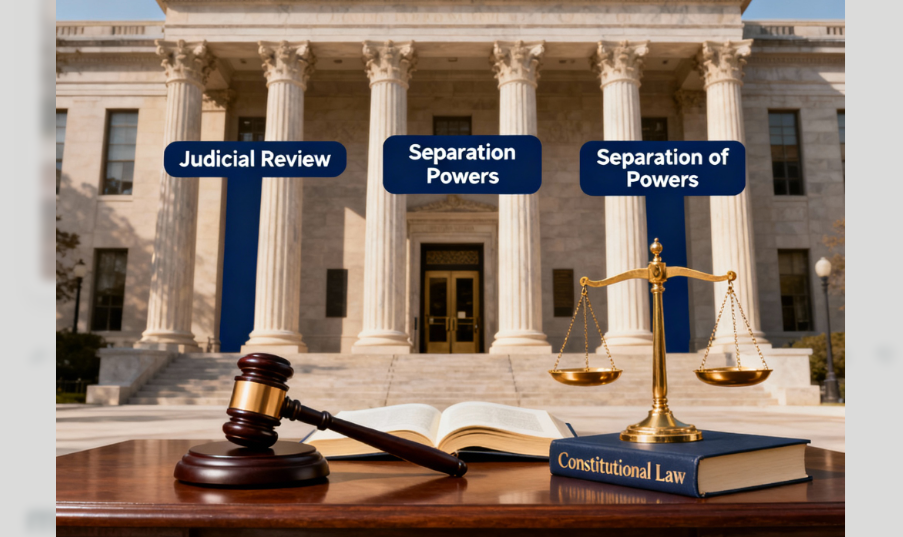Published on: 02nd October 2025
Authored By: Manshi Sahu
Shri Ram Institute of Law, Jabalpur
Equivalent Citation: 1978 AIR 597, 1978 SCC (1) 248
Petitioner: Maneka Gandhi
Respondent: Union of India
Date of Judgment: 25 January 1978
Bench: Hameedullah Beg (CJI), Y.V. Chandrachud, S.M. Fazal Ali, P.N. Bhagwati & P.S. Kailasam
Introduction
The case of Maneka Gandhi v. Union of India (1978) is a landmark decision that significantly broadened the interpretation of Article 21 of the Indian Constitution, which guarantees the protection of life and personal liberty. The case arose when Maneka Gandhi’s passport was impounded by the government under Section 10(3)(c) of the Passport Act, 1967, without providing her with any reason. This pivotal case established that personal liberty cannot be curtailed without a fair and just procedure. It also introduced the “Golden Triangle Principle,” linking Articles 14, 19, and 21 to ensure that laws affecting personal freedom meet the standards of fairness, equality, and reasonableness.
Prior to this decision, Article 21 granted the right to life and personal liberty primarily against arbitrary administrative action but not against legislative action. This case fundamentally transformed that understanding and expanded the protection to encompass legislative actions and measures as well.
This case is recognized as one of the most significant verdicts rendered by the Supreme Court, as it helped restore public faith in the judicial system and constitutional values. In this landmark judgment, the Supreme Court introduced and incorporated the “Golden Triangle” rule, strengthening its position as the guardian of democracy.
The decision pronounced by the Honourable Supreme Court on 25 January 1978 marked the beginning of a new phase in the understanding of fundamental rights granted by the Constitution. This decision transformed the landscape of Indian constitutional law and initiated a new era in the development of personal liberty jurisprudence. The ruling serves as a beacon of hope, providing new dimensions and approaches to the fundamental rights enshrined in Part III of the Indian Constitution.
Facts of the Case
In this case, the petitioner, Maneka Gandhi, had her passport seized by the authorities of the Ministry of External Affairs. On 1 June 1976, Maneka Gandhi’s passport was issued under the Passport Act, 1967. In the following year, 1977, her passport was seized by the authorities without any prior notice and without providing any reason for the action. She was not informed of the grounds for this unilateral decision taken by the Ministry of External Affairs.
Maneka Gandhi invoked the writ jurisdiction under Article 32 before the Honourable Supreme Court of India. She argued that the State had impounded her passport, which resulted in a direct infringement of her fundamental rights and personal liberty guaranteed under Article 21 of the Indian Constitution. It is important to note that in Satwant Singh Sawhney v. D. Ramarathnam (1967), the Supreme Court held that the right to travel abroad falls within the ambit of Article 21 of the Indian Constitution. However, it remained unclear to what extent the Passport Act could dilute this right.
The authorities who seized her passport stated that the reasons could not be disclosed in the “larger public interest.” The petitioner contended that the failure to state reasons directly infringed her fundamental rights under Articles 14, 19, and 21. Hence, a writ petition was filed under Article 32 for the violation of these fundamental rights.
Legal Issues
- Whether the ‘Right to Travel Abroad’ has any protection within the meaning of Article 21?
- What is the scope of the phrase ‘procedure established by law’ under Article 21?
- Whether fundamental rights guaranteed under the Constitution are conditional or absolute?
- Whether the disputed Regional Passport Officer’s order violates the principles of natural justice?
Contentions
Petitioner’s Contentions
- The ‘Right to Travel Abroad’ is a component of personal liberty, and no citizen can be deprived of this right except according to the procedure prescribed by law. The Passport Act, 1967, does not prescribe any procedure for confiscating, revoking, or impounding a passport. Hence, the action taken is unreasonable and arbitrary.
- For a well-ordered and civilized society, the freedoms guaranteed to citizens must be regulated. Therefore, reasonable restrictions were provided by the Constituent Assembly in clauses (2) to (6) of Article 19 of the Constitution. However, these restrictions do not provide any ground to justify the action taken in this case.
- The Central Government has acted in violation of Article 21 of the Constitution by not providing the petitioner with an opportunity to be heard. Hence, the true interpretation of Article 21, as well as its nature and scope of protection, must be determined.
- Article 22 of the Constitution confers protection against arrest and detention in certain cases. In this case, by confiscating the petitioner’s passport without providing any reasons, the government has effectively detained her within the country illegally.
Respondent’s Contentions
- The “Right to Travel Abroad” was never covered under any clause of Article 19(1); therefore, Article 19 of the Constitution is irrelevant to determining the reasonableness of the action taken by the Central Government.
- The word “law” under Article 21 of the Constitution cannot be interpreted in light of fundamental principles of natural justice.
- Principles of natural justice are vague and ambiguous. Therefore, the Constitution should not refer to such vague and ambiguous provisions as part of its framework.
- Article 21 of the Constitution is very wide and encompasses within itself the provisions of Articles 14 and 19. However, a law can only be termed unconstitutional under Article 21 when it directly infringes Articles 14 and 19. Hence, the Passport Act is not unconstitutional.
- Article 21 of the Constitution uses the phrase “procedure established by law,” and such procedure need not pass the test of reasonableness.
Applicable Law
Passport Act, 1967 – Section 10: Explains variation, impounding, and revocation of passports and travel documents, wherein the authority may seize a passport for specified reasons.
Constitution of India:
- Article 14: Right to equality and equal protection of law within the territory of India.
- Article 19: Provides freedom of speech and expression, which includes the right to express one’s opinion freely without fear through oral, written, electronic, broadcasting, or press mediums.
- Article 21: No person shall be deprived of his life or personal liberty except according to a procedure established by law.
Principle of Natural Justice: This principle means that no one shall be condemned unheard; there must be fairness on the part of the deciding authority.
Audi Alteram Partem: The literal meaning of this principle is that both parties should be given fair opportunities to present themselves before a court of law, and a fair trial should be conducted.
Judgment
The Court fundamentally changed constitutional interpretation by holding that Article 21 cannot permit arbitrary or irrational procedures, even though it uses the phrase “procedure established by law.” The framers of the Constitution always intended the procedure to be fair, just, and reasonable. The Court overruled the decision in A.K. Gopalan v. State of Madras (1950) and held that Articles 14, 19, and 21 are interconnected, and any law must meet the standards set by all these Articles.
The Court decided that “personal liberty” should be understood broadly and liberally, not narrowly and restrictively. Article 21 includes the right to travel internationally, as previously recognized in the Satwant Singh case. The Court stated that Sections 10(3)(c) and 10(5) of the Passport Act constitute administrative orders that can be challenged for being unreasonable, capricious, violative of natural justice, and ultra vires.
The Supreme Court, with justices including Justice P.N. Bhagwati, Fazal Ali, and others, unanimously held that the action of impounding Maneka Gandhi’s passport violated her rights under Articles 21 and 14 of the Constitution. The Court expanded the scope of Article 21 from a narrow interpretation of due process to a broader concept of personal liberty that includes procedural fairness, reasonableness, and justice. Consequently, any deprivation of personal liberty must adhere to principles of fairness and prevent arbitrary state action.
Impact
This judgment marked a pivotal shift in Indian constitutional law. By broadening the interpretation of Article 21, the Court set a precedent that state actions affecting personal liberty must adhere to principles of fairness and justice, thus preventing arbitrary governmental actions. This case serves as a cornerstone for subsequent rulings that protect individual freedoms from unjustified state interference, reinforcing the judiciary’s role in upholding constitutional rights and safeguarding democratic values.
Conclusion
Maneka Gandhi v. Union of India stands as a seminal case in Indian constitutional law. The Supreme Court’s decision significantly expanded the scope of personal liberty under Article 21, integrating it with Articles 14 and 19. The case illustrates that any law or administrative action that curtails personal liberty must be non-arbitrary, fair, and subject to the principles of natural justice. The Court held that even where a statutory provision grants discretionary power to the State, such power must be exercised with judicial oversight to prevent abuse.
The ruling also provides an important reminder that fundamental rights in the Indian Constitution are interrelated. In evaluating administrative actions that affect these rights, courts must ensure that procedures are transparent and that opportunities are provided for affected parties to be heard. This case, therefore, has set a precedent that continues to influence the balance between state authority and individual liberty in India.
References
- Launchpad Education. (n.d.). Retrieved from https://launchpadeducation.in
- Lawful Legal. (n.d.). Retrieved from https://lawfullegal.in
- Legal Service India. (n.d.). Retrieved from https://www.legalserviceindia.in




